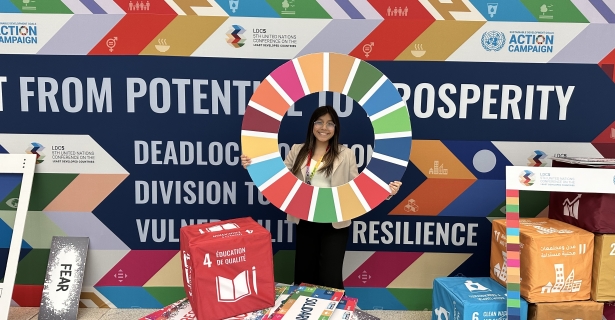These past three days of the United Nations LDC Conference have been filled with high-level discussions, interactive sessions, remarkable speakers, connections, and bonding with the local culture. After a more than thirty-one-hour trip passing through Boston, New York, and Manchester, I finally made it to the Doha Hamad International Airport during the early morning hours. After check-in at the hotel, I could not have been more excited for what was awaiting ahead: an opportunity to hear the role of our society/countries towards the Least Developed Nations in our international system.
During the first day of the Conference, our delegation was able to attend the Opening Plenary where we heard remarks from the President of the Conference and Emir of Qatar, Tamim bin Hamad Al Thani. His message focused on the global responsibility and moral obligation in finding solutions for the LDCs. After his speech, António Guterres, Secretary-General of the UN, highlighted how meaningful it is to transform the Doha Programme of Action into results. The Opening Plenary concluded with a speech from a youth delegate that the Conference is “not only to talk about the problems, but to enact on them” and looking toward a future where the term LDC is only in history books. After the Opening Plenary, my favorite event of the day was the Civil Society Forum about Multiple Crises and Challenges for LDCs. The discussion and interchange of ideas in the room prompted my intellectual curiosity. Some of the main learning included how for every 1 USD received in the LDC, 3 USD left, and that the crisis faced in LDCs demanded a scaled response in quantity and quality. My main takeaway was from Cristina Duarte —Special Adviser on Africa to the United Nations— she stated that the starting point was to change the mindset from managing poverty to managing development in Africa.
During the second day of the Conference, I attended the following sessions: “Transforming education in LDCs: ensuring a focus on inclusion and gender equality,” “Private Sector Forum Thematic Session 2: Agriculture & Rural Development,” “Holistic and multisectoral interventions to address systematic and structural vulnerabilities in LDCs: lessons learned from Angola”, and the Plenary Session General Debate in the afternoon. The latter was the one which shaped my experience on the second day. Being able to be in a room where representatives from across the world were sharing their plans towards the LDCs and the progress made by their nations was insightful. For example, Zimbabwe shared the mixed progress for LDCs, the need for financial and investment assistance, how the six development areas of the Doha Programme of Action are critical for LDCs' development, and how the pandemic showed the vulnerability of LDCs. Latvia's representative pointed out the importance of solidarity and cooperation and the role of the country in supporting women. Singapore expressed the critical midpoint in the journey towards fulfilling the goals, the financial gap, and that multilateral cooperation is meaningful, which was demonstrated during the pandemic. Finally, Solomon Islands stated that cooperation and solidarity with the LDC family transform the lives of all people and humanity.
On the conference's third day, I was most interested in attending the session “From the Vulnerable to the Empowered: Ensuring Access to Schools for Children Affected by Conflicts in LDCs.” Before coming to Tufts, I got involved and led initiatives that promoted quality education in Latin America. Education is an area that sparks my interest, and it is where I want to continue my journey on social impact. Education is a human right that needs to be guaranteed to every person, however, in practice that is not how it looks. This session dove deeper into how essential it is to protect and safeguard children from harm and how necessary it is to offer them a place to learn, develop and grow. The Secretary General of Children in Armed Conflict addressed how education is an inherent right and that children need to reach their full potential. Additionally, she expanded on what needs to be done, including regional protection and support in conflict areas, the need for more action and implementation beyond endorsing the declaration, allocating resources to support education in armed conflict areas, and restoring hope to children that are affected by conflict. After the session, I spent time going through the exhibition where there were multiple stands of different NGOs, organizations, and corporations, among others, and gaining more valuable insights into the problems faced by LDCs today. I definitely look forward to my last day at the Conference!

